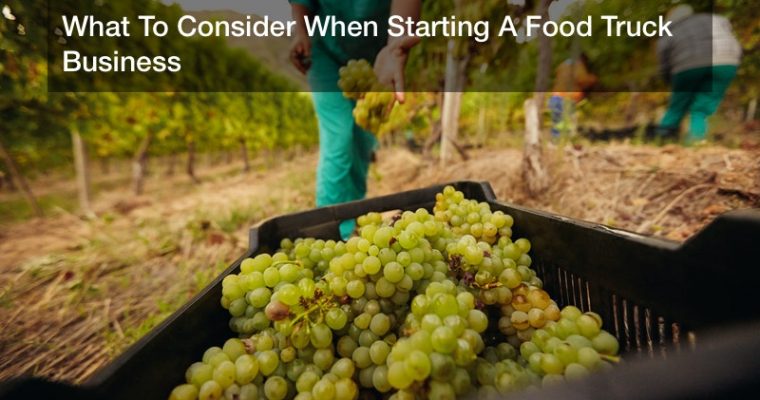
Do you dream of opening a food truck and winning $50,000 with your mad culinary skills? Food Network’s “The Great Food Truck Race” has foodies everywhere dreaming of the possibilities. This show is just one of the many outcomes resulting from the food truck craze. Mobile dining dates all the way back to 1691 with the first mentions in New York City. Before trucks, Chuckwagons served food to cattlemen while they were out managing the herds. Their rickety wheels have evolved significantly from what used to be a necessity for cowboys into a luxury food vehicle. The popular trend has been to host festivals where several trucks come together for an afternoon of mobile feasting.
It’s certainly a unique culture to be a part of, but how do you go about opening a food truck of your own? Here are a few key things you’ll need to consider.
Capital

The chances of you opening a food truck are slim if you don’t have the capital necessary to get started. It’s best to begin saving and financing your way to your own business. It’s best to break expenses down into two main categories: start-up expenses and operating costs.
Start-up expenses include everything you need for opening a food truck business for the first time. This might be the down payment for the truck, bodywork, and cooking infrastructure. Other things to think about include business registration, licensing, permits, and food vendor account setup fees. Most are initial costs that shouldn’t have to be paid again unless you are making a drastic change, but once the business is rolling, you will have to maintain it with operating costs.
Operating costs are like paying rent. Often they will be monthly costs that are needed to sustain the business month after month. Before opening a food truck, it is best to calculate this monthly cost to understand if your dreams and plans are feasible. Operating costs include but are not limited to payroll funding for employees, fuel, propane, ingredients, and office supplies. Since you have a mobile foundation, you will need to schedule regular maintenance for the truck. It also doesn’t hurt to set aside extra cash in case it is ever in need of a repair.
Taking time to map out the start-up and operating costs that are needed in opening a food truck can prevent a headache later on down the road. Knowing the financial needs now will eliminate the potential for the business to become a burden.
The Truck

What makes you a mobile cuisine is your food truck. When opening a food truck, there needs to be specific thought into the purchase of the truck. You have two options, buying a pre-owned vehicle or buying a new one. A pre-owned vehicle will likely cost less, but it may need more maintenance so it is best to weigh out what the difference might be. A new truck will come with warranties and it will also give you a chance to customize exactly what you want, which leads to the next few considerations before making that big first purchase.
Make sure you know what you need. What kind of food will you be serving? What kind of room do you need to make that food? Do you plan to have a small business or are you trying to upscale to have sales constantly flying out the window? If you plan on building a big business, this will require more space and room for supplies. You’ll also need to consider your staff size. Cramped quarters make for unhappy employees and a less clean environment. You want to make sure the truck will accommodate both sales and the humans making those transactions happen.
Another important consideration that goes along with the truck size is where you plan to sell your food. It may seem easy to just park anywhere, pop open the awning and hand out food, but there are zoning restrictions and permits you must abide by. Be sure to check out and rules and regulations that are set by your state or local community. They might only allow a certain size truck or a certain place to park. This can drastically affect the profitability of your business. To maximize your sales, you need to check out what room you have to grow your business and purchase a truck accordingly. This way you won’t end up having too much truck and not enough business to pay for it.
Branding

Once you make the leap to purchase the truck, now the fun in opening a food truck can begin. The best companies know branding is what brings success. This is the chance to set yourself apart from the rest and create a unique name, slogan, and logo that can be plastered all over social media.
The benefits of branding are nearly countless. This is the image you create for your food truck. It boosts employee morale by giving them a sense of belonging. They can take pride in knowing the pink truck is theirs or the one with the monkey logo is recognized wherever they go. Happy employees lead to a pleasant workspace and an increase in productivity. Your food truck will become known first for its own unique fingerprint based on the branding. That will, in turn, become associated with the quality customer service your employees have towards their job.
The most important goal of this branding is to create a healthy emotional connection between the business and its customers. You want to be recognized for your service and products. You want customers to recall the good people and kind food so they will recommend your food truck to others. Make the branding memorable.
Inventory

To run a business smoothly, you will need to have constant inventory. This should be accounted for in the estimation of monthly operating costs. Inventory is all the supplies you need to run your food truck. This includes anything from receipt paper rolls to proper grease disposal apparatuses and all the food ingredients in between.
Decide on the type of cuisine you will offer. Mexican food is one of the most popular international styles of food sold in the U.S., but maybe you want to be a smoothie truck. These two food types require very different inventories, but both need to have adequate space to store everything. This goes back to ensuring you have selected the right truck for the job. If you choose to sell tacos, you’re going to need the proper cooling equipment to keep meat fresh. If you sell smoothies, you’re going to need space for continuous fresh fruit.
Also affecting inventory is the amount of business your truck sells. When you’re first opening a food truck, it might take off and then level out. The sales might fluctuate with the season. The important thing to remember is to monitor your sales carefully in your first year. This will give you a baseline to refer to when sales are high or low. This will help predict how much inventory you will need to order or keep stocked to meet the demands of the business. Too much and you’ll waste food and money. Not enough and you’ll hurt your brand image by denying what customers are requesting simply because you are out of inventory. It’s a fine, fine balance.
Places to Go

This should already be established before purchasing a food truck, but be sure to look into locations you’re interested in parking and selling. Naturally, the bigger cities are known for having food trucks on their streets, but if you’re one for smaller communities, you’ll need to look over their requirements carefully. Some food industry personnel believe location can be a greater factor in business success than the menu.
While you are mobile, it is best to establish a consistent route and save the side trips for later. To build your business, you want to establish a reputable clientele. You want them expecting you to be there on their lunch breaks. You want to expect the constant flow of customers at the city parks. Consistency is what will help ground your business when first opening a food truck. When people start recognizing you, that’s when you can start making random stops as special treats.
Get to know your city. Are there other food trucks around? Park next to them. Even though there is competition, a greater density of trucks will attract more people. Is there a large nightlife? People are always hungry after a few drinks and lining up next to the bars could bring in a pretty penny or two. Are there festivals around? These might be considered a side excursion, but sign your truck up! This will gain you business and more exposure. People flock to these events for the sole purpose of eating good food. Lastly, find yourself some college campuses to frequent. Even if it is only one or two days out of the week. College school kids are always looking for convenient food on the go and the density of people in one area will be consistent.
Plan for the Off Hours

While opening a food truck is exciting, you have to remember that at the end of the day, you are running a business. Just because you are off the clock and away from customers doesn’t mean your responsibilities end. One thing to look into is commercial security. This is how you protect your business from intrusions, theft, and vandalism. You’ll want to find good security systems that protect your truck when you’re not around.
The truck is relatively a small space on wheels, perfect for stealing. Protect yourself as best you can by installing locks at every door and entryway. Make sure windows are tight and sealed. It would also be beneficial to install an alarm system both in the front of the truck and the body. Whatever you decide, keep in mind, the truck is the sole means for making a profit.
The Basics of Opening a Food Truck
If this is the first time you are opening a food truck, the key is to plan ahead. Know your start-up costs and estimate your operating costs. This will help reduce financial stress later. Pick a truck that meets your specific business needs and know what amount of business you plan to do. Brand yourself to establish a well known and respected image. That way wherever you go, people will know you. Lastly, gauge the right locations for your cuisine, pack the truck full of inventory and sell, sell, sell until you lock it up for the night to prepare for tomorrow!
More: 2012 food truck for sale, a food trailer, average cost for food truck catering, barbecue truck for sale, best way to start a food truck, business plan for starting a food truck, business to start with a truck, buy a lunch truck, california food truck regulations, custom food trucks california, drivable food truck, food license for food truck, food trailer california, food trailer cost, food trailer for sale ny, food truck accounting spreadsheet, food truck bookkeeping, food truck business proposal, food truck checklist, food truck food suppliers, food truck for sale craigslist michigan.

